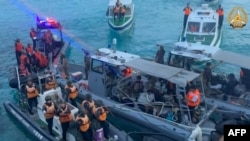As the maritime conflict between China and the Philippines escalates, Japan and the Philippines are set to meet Monday for talks to deepen their security cooperation.
The talks in Manila, known as the "two plus two" meeting, will bring together the Japanese and Philippine foreign and defense ministers to potentially finalize a key defense agreement.
Romeo Saturnino Brawner Jr., chief of staff of the Armed Forces of the Philippines, said at a press conference on Thursday that he hopes the Philippines will sign the defense agreement, known as the Reciprocal Access Agreement, or RAA, with Japan, which will allow either side to deploy troops on the other's territory.
The RAA also stipulates how the two countries are to arrange weapons and ammunition when they conduct joint training, and it lays out the procedures in the event of any accidents.
Philippine Senator Francis Tolentino said earlier that the draft agreement also specifies the legal status of the Philippine military and the Japanese Self-Defense Forces when they temporarily stay in each other's country.
Japan and the Philippines are also expected to discuss a Japanese program, launched in April 2023, that provides weapons and equipment free of charge to like-minded countries to increase security cooperation. In November, Japan provided the Philippines with five surveillance radars to strengthen its coastal supervision capabilities.
Nations have grown closer, says expert
Saya Kiba, an associate professor of international relations at Kobe University of Foreign Studies in Japan, says that Tokyo and Manila have had increasingly close relations in recent years.
Kiba told VOA Mandarin in a video interview that in addition to discussing existing cooperation frameworks, the two countries are expected to plan further defense exchanges.
The talks come at a time of escalating tensions over China's actions in the disputed South China Sea.
On June 17, Chinese and Philippine military vessels collided at the Second Thomas Shoal ("Ren'ai Reef" in Chinese), part of the Spratly Island chain where several nations have overlapping claims. A Filipino crew member lost a finger in the crash that Manila described as "intentional-high speed ramming" by the Chinese coast guard.
On July 4, the Philippine military asked China to pay over $1 million (60 million pesos) in financial compensation for the June collision. The Chinese Foreign Ministry called on the Philippines to stop "provocations," saying that China was safeguarding its rights and enforcing the law. It said the Philippines should "bear the consequences of its infringement activities."
Julio Amador III, CEO of Amador Research Services, a consulting firm in the Philippines that provides policy analysis and strategic advice on ASEAN and Southeast Asian issues, said that the Philippines and Japan may be close to completing negotiations on the RAA, and that the "two plus two" meeting would be a good time to announce the agreement.
However, the agreement would not take effect immediately as it must first be signed by the leaders of the two countries.
A signal to Beijing
Kei Koga, a professor at Nanyang Technological University in Singapore, pointed out in a video interview with VOA Mandarin that an RAA signed by Japan and Australia in January 2022 was not ratified until a year later.
Nevertheless, he said that the RAA will send a signal to Beijing that Japan and the Philippines "will conduct more types of military collaboration and cooperation," which can have a deterrent effect on China's hegemonic behavior at sea.
Kei emphasized that Japan's constitution says its Self-Defense Forces can only defend their own country and cannot go abroad to fight. That limits the scale of military force that Japan can deploy in the South China Sea.
Kobe University's Kiba agreed that Japan's military influence in the South China Sea will be limited since the Japanese Self-Defense Forces can only conduct multilateral and joint exercises with allies.
"So, if the Philippines is attacked in the future, the United States may be the only ally that can provide assistance, because this is the form of alliance," Kiba said.




